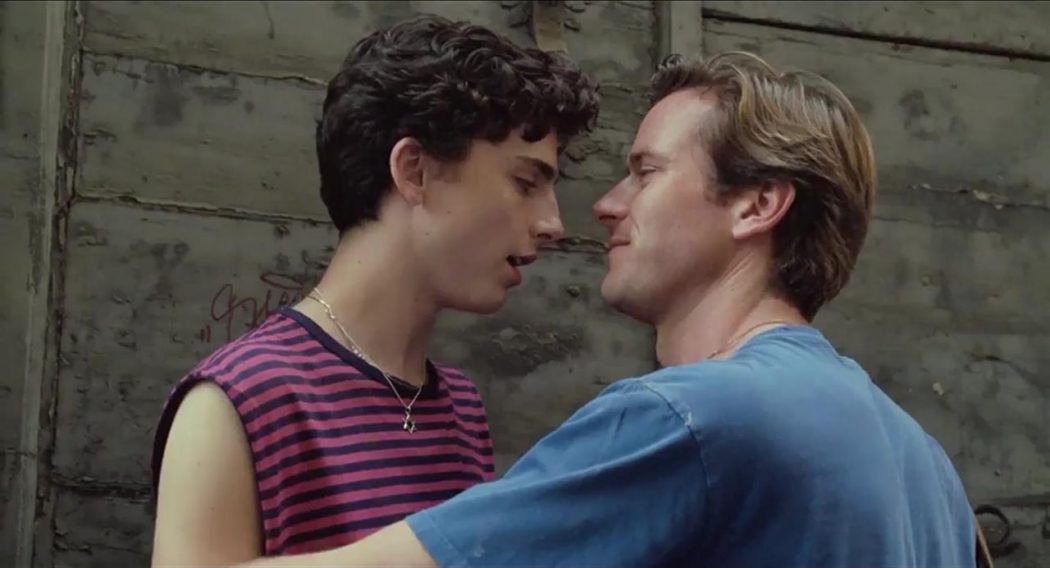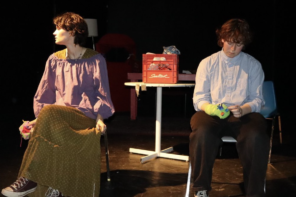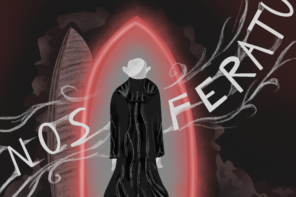Almost no joy is greater for a film fan than seeing an artist do the great work you always believed they could do. Call Me by Your Name offers this wonderful sensation three times. Timothee Chalamet, who up to this point has been confined to blockbuster roles as Famous Actor’s Child, finally has the room to demonstrate his potential as an actor who can make dialogue sing and music speak. Armie Hammer, who’d been trapped as Handsome Leading Man in paper-thin Hollywood films ever since The Social Network, finally gets a role with substance and soul. And Luca Guadagnino, who up to this point has made energetic, passionate, but imperfect films, has finally made an energetic, passionate, perfect one.
A college professor (Michael Stuhlbarg) and his wife (Amira Cesar) travel to their summer home in sun-baked northern Italy, bringing along their 17-year old son Elio (Timothee Chalamet) and one of Shuhlbarg’s grad students, a 24-year old man named Oliver (Armie Hammer). Cool and cocky, you’d mistake him for a football player if he didn’t know so much about etymology and Heidegger. Him and Elio start out both vying for the affection of Chiara, one of Elio’s many unsuccessful summer flings, but soon the relationship moves from a romantic arms race to an uneasy truce, and then a tense, unstable friendship, as Elio discovers a change in his own feelings, and Oliver discovers just what those feelings are.
Guadagnino doesn’t bother with anything extraneous. There are no disapproving relatives, no religious or legal persecution, there’s no real love triangle, and there’s no talk of the AIDS crisis or the Reagan crusade to cover it up. All those things may be going on in the real world, but we’re far away with Elio and Oliver, taking a vacation from them. The conflict arises from the characters alone, since Elio and Oliver’s relationship is stormy and always a bit off-balance; they are both worried of giving too much or not giving enough. It’s clear this is Elio’s first time, and we can infer that Oliver knows his way around. They are both a bit scared of their own feelings, but they aren’t particularly scared of anyone else’s. The only external conflict, keeping the relationship out of sight from the family maid, is comedic in nature.
The relaxed pace and emotional tone is preserved until a bombshell final 20 minutes which I dare not spoil
In fact, much of the film is played for comedy, the comedic sort of sly double-entendres that are privy to only Oliver, Elio, and the viewer. Guadagnino relishes the sort of freedom that a secret relationship allows, as Oliver and Elio make coded references to their double-life in the company of clueless parents. After making a plan to meet at midnight, Oliver and Elio are always asking “Do you have the time?” or saying, “Nice watch”, and Guadagnino’s coy cinematography always reflects a light off the watch, keeping it in the back of your mind. Thus, the most ordinary objects – watches, cigarettes, bicycles, hard boiled eggs and fresh apricots (especially the apricots) – are given a metaphorical significance that’s novelistic and yet visual. If your eyes follow just the props of the film, the story is still crystal clear.
It’s all about foreplay and embrace, tension and release, and the same goes for the form. Guadagnino’s camera is less hyperactive than it was in A Bigger Splash, but no less dynamic. A marvelous scene shot in the town square – as Elio and Oliver walk along opposite sides of a fountain, getting further apart and then finally, decisively, closer together – springs to mind immediately, but the small scenes are no less brilliant. Elio’s only way downstairs in the house is through Oliver’s room, and the only way through there is through the bathroom. A lesser filmmaker would play this for a cheap joke, one character walks in on another, but Guadagnino finds just about ten different ways to highlight this doorway, using it as a window, a frame, and staging lovely tracking shots as both characters go to bed and exchange a glance through it. Any filmmaker can shoot the big scenes with weight, but Guadagnino’s camera finds the cinema in all moments, big and small. As Timothee Chalamet has said, Guadagnino didn’t treat “any of the lovemaking scenes with any more ceremony than the swimming scenes or bike-riding scenes.”
I was worried that a ceremony was coming. Guadagnino’s previous films have forced Big Plot Points into similar narratives which would’ve played better without them (A Bigger Splash is the bigger offender). But somehow, perhaps by divine miracle, Guadagnino’s greatest weakness has been transformed into this film’s greatest strength. The relaxed pace and emotional tone is preserved until a bombshell final 20 minutes which I dare not spoil. Guadagnino has finally found a way to have his cake and eat it too. The “twists” are earth-shattering and yet just as small as the swimming and the bike-riding. They force the audience to recall the film and watch it over again in their mind. After this twist, a similarly unexpected coda around Christmas, when Elio and his family return to the house, forces us to recall the imagery and the emotions we’ve felt.
Why do we remember certain looks, certain touches, certain objects more than others?
Memory, I believe, is Guadagnino’s ultimate thesis. His film forces us to consider the moments we remember and why. Why do we remember certain looks, certain touches, certain objects more than others? All along, the film feels so immediate, so tactile, Guadagnino’s camera so alive, and yet in retrospect everything seems just a bit far away. The editing, which chops the film up into a series of moments with no dead air, feels like a memory. We’ve spent the whole film in Elio’s head, agonizing over what could be a sign from Oliver and what couldn’t, and finally we are allowed to consider the whole picture.
Fittingly, I have been remembering this film with great joy since I saw it a couple months ago. Call Me By Your Name is an uncommonly great film. It’s as articulate as a great book, as colourful and textured as a great painting, as full-bodied as the ancient sculptures that the professor studies, as rhythmic and lyrical as a great piece of music. It’s as confident as Oliver and as tender as Elio. It seems to contain all art and all emotion within it. It’s the type of film that deserves thousand-page essays and shot-by-shot analysis. It will carve out a special place in your memory.
It premieres at the Cineplex Forum on December 15th, and it’s well worth the subway ride to get there. If you don’t see it, you’ll forever wish you did. And when you see it, you’ll wish you’d seen it sooner, and regret wasting so much time.








